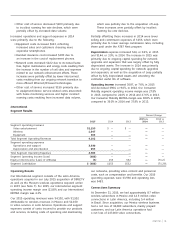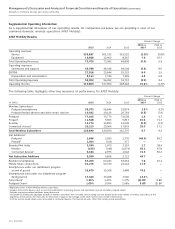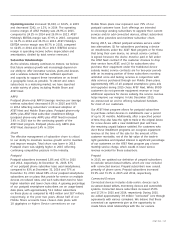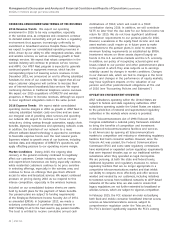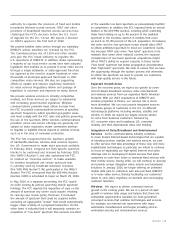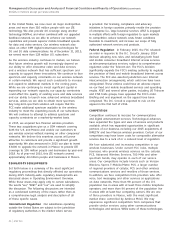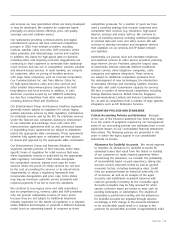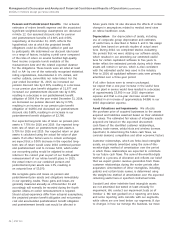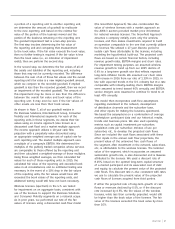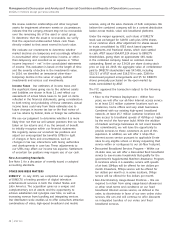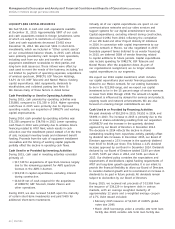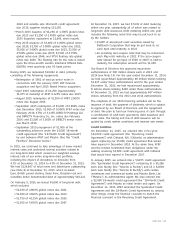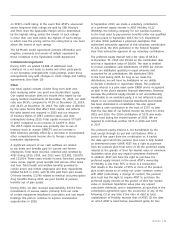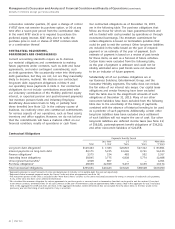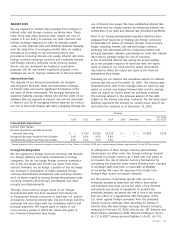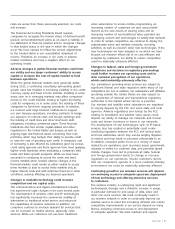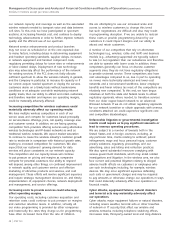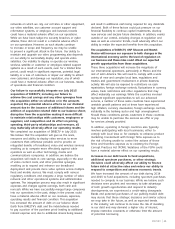AT&T Wireless 2015 Annual Report Download - page 31
Download and view the complete annual report
Please find page 31 of the 2015 AT&T Wireless annual report below. You can navigate through the pages in the report by either clicking on the pages listed below, or by using the keyword search tool below to find specific information within the annual report.
AT&T INC.
|
29
Unlimited Data Plan Claims In October2014,
the FTC filed a civil suit in the U.S. District Court for the
Northern District of California against AT&T Mobility, LLC
seeking injunctive relief and unspecified money damages
under Section 5 of the Federal Trade Commission Act.
The FTC’s allegations concern AT&T’s Maximum Bit Rate
(MBR) program, which temporarily reduces the download
speeds of a small portion of our legacy Unlimited Data Plan
customers each month. MBR is an industry-standard practice
that is designed to affect only the most data-intensive
applications (such as video streaming). Texts, emails,
tweets, social media posts, Internet browsing and many
other applications are typically unaffected. Contrary to
the FTC’s allegations, which we vigorously dispute, our
MBR program is permitted by our customer contracts,
was fully disclosed in advance to our Unlimited Data Plan
customers, and was implemented to protect the network
for the benefit of all customers. In March2015, our motion
to dismiss the litigation on the grounds that the FTC lacked
jurisdiction to file suit was denied. In May2015, the
Court granted our motion to certify its decision for
immediate appeal. The United States Court of Appeals
for the Ninth Circuit subsequently granted our petition to
accept the appeal, and the appeal is now pending before
that Court while limited discovery proceeds in the District
Court. In addition to the FTC case, several class actions have
been filed also challenging our MBR program. We vigorously
dispute the allegations the complaints have asserted.
On June17,2015, the FCC issued a Notice of Apparent
Liability and Order (NAL) to AT&T Mobility, LLC concerning
our MBR policy that applies to Unlimited Data Plan customers.
The NAL alleges that we violated the FCC’s Open Internet
Transparency Rule by using the term “unlimited” in connection
with the offerings subject to the MBR policy and by failing
adequately to disclose the speed reductions that apply
once a customer reaches a specified data threshold. The NAL
proposes a forfeiture penalty of $100, and further proposes
to order us to correct any misleading and inaccurate
statements about our unlimited plans, inform customers
of the alleged violation, revise our disclosures to address
the alleged violation and inform these customers that
they may cancel their plans without penalty after reviewing
the revised disclosures. On July17,2015, we filed our
response to the NAL. We believe that the NAL is unlawful
and should be withdrawn, because we have fully complied
with the Open Internet Transparency Rule and the FCC has
no authority to impose the proposed remedies. The matter
is currently pending before the FCC.
• Internet Interconnection Disclosure Requirements –
We will submit to the FCC new interconnection
agreements we enter into with peering networks
and with “on-net” customers that purchase Managed
Internet Service to exchange Internet traffic with
other AT&T customers. We will develop, together with
an independent expert, a methodology for measuring
the performance of our Internet traffic exchange and
regularly report these metrics to the FCC.
• Compliance Program and Reporting – We have
appointed a Company Compliance Officer to develop
and implement a plan to ensure compliance with these
merger conditions. We will engage an independent,
third-party compliance officer to evaluate the plan and
our implementation. Both AT&T and the independent
compliance officer will submit periodic reports to the FCC.
The conditions will remain in effect for four years from
July24,2015. A condition may be extended once for two
years if the FCC makes a formal finding that we have
violated the condition in whole or in part.
Litigation Challenging DIRECTV’s NFL Sunday
Ticket More than a dozen putative class actions have
been filed in the U.S. District Courts for the Central District
of California and the Southern District of New York against
DIRECTV and the National Football League (NFL) alleging
that the NFL and DIRECTV violated federal antitrust law in
connection with the NFL Sunday Ticket package. Among
other things, the complaints allege that plaintiffs have been
overcharged for the televised presentation of out-of-market
NFL games due to DIRECTV’s exclusive agreement with the
NFL to broadcast out-of-market games through the Sunday
Ticket package. The complaints seek unspecified treble
damages and attorneys’ fees along with injunctive relief.
The first complaint, Abrahamian v. National Football League,
Inc., et al., was served in June2015. In December2015,
the Judicial Panel on Multidistrict Litigation transferred
the cases outside the Central District of California to
that court for consolidation and management of pre-trial
proceedings. We vigorously dispute the allegations
the complaints have asserted.
Federal Trade Commission Litigation Involving
DIRECTV In March2015, the Federal Trade Commission
(FTC) filed a civil suit in the U.S. District Court for the
Northern District of California against DIRECTV seeking
injunctive relief and unspecified money damages under
Section5 of the Federal Trade CommissionAct and
Section4 of the Restore Online Shoppers’ ConfidenceAct.
The FTC’s allegations concern DIRECTV’s advertising,
marketing and sale of programming packages. The FTC
alleges that DIRECTV did not adequately disclose all relevant
terms. We are disputing these allegations vigorously.


